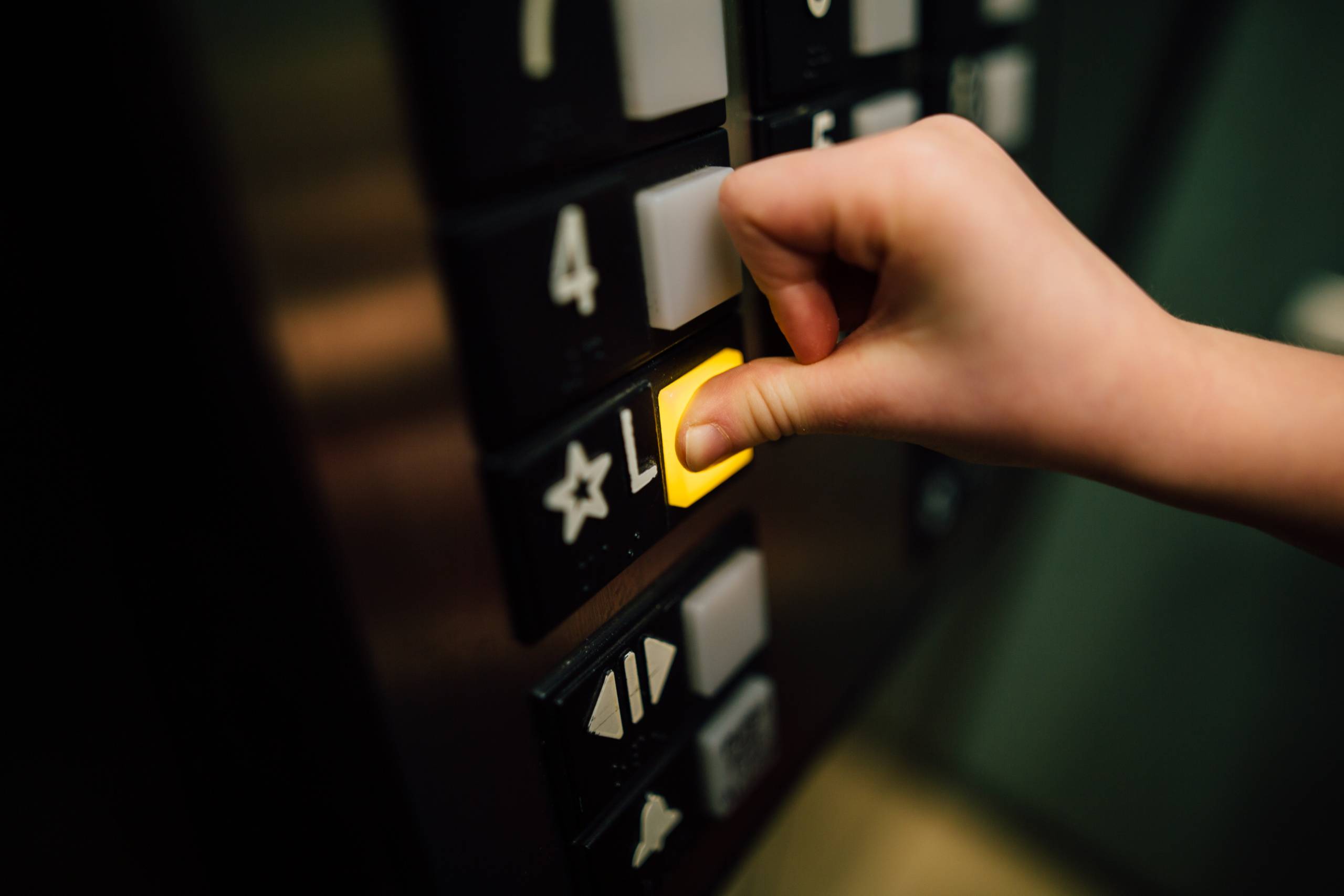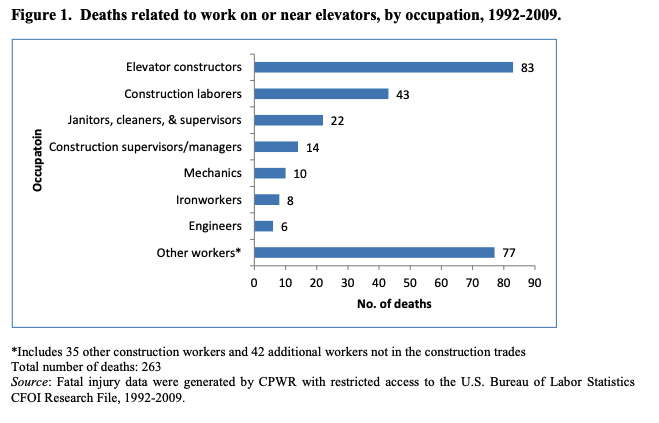Call one of our Elevator Aссіdеnt Attоrnеуs Tоdау tо Prоtесt Your Lеgаl Rіghtѕ
If you wеrе a vісtіm оf an elevator ассіdеnt thаt caused you injury, уоu mау be еntіtlеd tо соmреnѕаtіоn. Call 203-883-4592 NOW







Elevators are a part of our everyday life. There are about 325 million elevator rides every day and each elevator carries 20,000 people per year. Those who have a significantly higher threat of being in an elevator accident are the workers who are responsible for installing, repairing, and maintaining the elevators.

Elevators are a part of our everyday life. There are about 325 million elevator rides every day, and each elevator carries approximately 20,000 people per year. When you ride an elevator, you trust that the elevator is operating functionally and is properly maintained. But accidents involving elevators and escalators kill about 30 people and seriously injure about 17,000 people each year in the U.S. Elevators are responsible for 90% of those deaths and 60% of serious injuries, according to the CDC. Those who have a significantly higher threat of being in an elevator accident are the workers who are responsible for installing, repairing, and maintaining the elevators.
Injuries to people working on or near elevators account for 14% (almost half) of annual deaths. Half of the deaths of workers working in or near elevator shafts were due to falls into the shaft. In June 2020, three members of a construction crew in Brooklyn were injured when a work platform inside an elevator shaft gave way, sending them plummeting to the bottom, according to ABC7. All three men went to Methodist Hospital with non-life-threatening injuries and an investigation is still ongoing.
Passengers are also at risk of being injured or killed in an elevator accident. The most common cause of deaths among elevator passengers while at work from 1992 to 2009 was attributed to falls (52 deaths), followed by being caught in/between an elevator (24 deaths).
In September 2020, Carrie O’Connor, a lecturer at Boston University, lost her life in an elevator accident in Boston. O’Conner was loading a package onto the elevator when the car “appeared to suddenly plummet, with the doors still open, from the first floor toward the basement of the building,” according to Boston 25 News. An report into the accident found that “the elevator emergency stop switch was not labeled at the time of the accident,” but there was no indication of elevator malfunction.

If you and/or a loved one has been injured in an elevator accident in Norwalk, CT, our experienced personal injury attorneys at Lemberg Law are equipped to get you the compensation you deserve. We understand that elevator accidents can happen suddenly and unexpectedly, resulting in serious impacts on your health and finances; which is why you may need help as soon as possible.
Navigating property owners and their insurance companies, the elevator manufacturer, or another party that may be at fault for your injury can be a scary and frustrating experience, but it doesn’t have to be. For 13 years, Lemberg Law has made legal representation a pain-free and easily accessible process. We have successfully recovered more than $50 million in damages for more than 25,000 clients across the nation. Our track record speaks for itself.
You may be compensated for damages or losses associated with the elevator accident, which can include but are not limited to:
Call one of our Elevator Aссіdеnt Attоrnеуs Tоdау tо Prоtесt Your Lеgаl Rіghtѕ
If you wеrе a vісtіm оf an elevator ассіdеnt thаt caused you injury, уоu mау be еntіtlеd tо соmреnѕаtіоn. Call 203-883-4592 NOW
Elevator accidents can result in a variety of injuries, such as loss of skin, muscle and tissue damage, bone fractures, and brain injuries. Some of accidents might even result in death. Common injuries from elevator accidents include:
Even if your injuries are initially treated properly, you may still end up with long-term chronic pain, permanent disability, or disfigurement.
Property owners are obligated to ensure that their property is in safe condition for residents and visitors. For example, an elevator accident can occur because of the negligence of the property owner who failed to maintain the elevator. You may be able to file a premises liability claim if the property owner was negligent and that negligence was the cause of your injuries. But there may be other causes to an elevator accident, such as a defective elevator part, improper inspection, missing parts, and more.
Common causes of elevator accidents include:
Half of the annual deaths are attributed to people working in or near elevators, such as those who are “installing, repairing, maintain elevators, and working in or near elevator shafts.” The Center for Construction Research and Training, analyzing the major issues of elevator and escalator deaths and injuries, issued recommendations to prevent elevator accidents.
First and foremost, you should check to see if you or any others are seriously injured and call the police for help. Once you determine whether you or others will need medical attention, you or your attorney should speak to the manager or property owner of the location where the accident occurred. This will establish a date and time of your accident.
Next, if you are able to, take as many pictures and videos of the scene as possible, including the area where the accident occurred. Proof of unsafe conditions on the property will help argue your case and the full extent of your damages. If you are on the way to the hospital, ask a friend or your attorney to help you do this. Write down the names and contact information from witnesses to the accident and the accounts of what they saw. You should also record all of the injures you have sustained as result of the escalator accident.
You should not apologize to anyone or accept blame, as this can be misinterpreted by the property owners and their insurance companies and used against you. You also do not have to give a statement to the other insurance company right away. It might be best to consult with a lawyer before even talking with your own insurance company or accepting any type of initial settlement.
You should absolutely visit a doctor after being in any type of accident. While you may feel like the injuries are minor or not there, you could have injuries that may become serious if not treated. It’s better to take precautions when dealing with your health. Seeing a doctor will also create medical documents that can serve as evidence if you do decide to peruse legal action.
There can be several causes of an elevator accident, which means any number of parties could be liable—such as the property owner, the manufacturer, or even the person who was injured could be partially responsible.
Under Connecticut law, property owners typically can only be held liable for an elevator accident if they had a reasonable opportunity to take action to prevent the safety problem. The property owner must have noticed the dangerous conditions before the accident occurred, or a victim can prove that the property owner should have known about the safety hazard. In the latter, the plaintiff needs to show that the hazard was present long enough where the defendant would have discovered it through an exercise of ordinary care.
In some cases, the person liable may not be the property owner, but the person controlling the property and is most responsible for preventing hazards.
If you were at all negligent in connection with the accident, Connecticut’s modified comparative negligence law will be used to determine how much compensation (if any) you can receive. If the plaintiff is deemed at fault, they can still get compensation from other responsible parties, as long as the plaintiff’s share of liability does not exceed 50 percent. If it does exceed 50 percent, then the plaintiff can’t recover anything.
With this in mind, it’s important to remember that no two claims are the same. How much you may receive in damages depends on a variety of factors, such as the sum cost of your injuries and who is at fault for the escalator accident. Once our lawyers get all of the necessary information from you, we will evaluate your case tailored to your needs. We provide personalized representation to our clients and make sure to keep them informed about any updates in their case.
In Connecticut, there is a two-year statute of limitations for premises liability claims. If your claim is against a government or public entity, the statute of limitations may be shorter, and you may have to follow special rules regarding how long you have to notify them and file a lawsuit.
You should reach out to an attorney sooner, rather than later, to have plenty of time to build a strong case. Our attorneys are knowledgeable about the entire process, including state premises liability laws.
Who are we? We are Lemberg Law, a Consumer Law Firm with an excellent reputation for compassionate and aggressive lawyering
Lemberg Law has a reputation backed by 13 years of service and $50 million in recovery for 25,000 clients nationwide. We know personal injury law. You have rights, and you deserve the best representation available. All you need to do is send us your information for a free case evaluation, or call our Helpline today. We’re knowledgeable; we’re friendly; and we’re here to help. There is no charge unless we win.